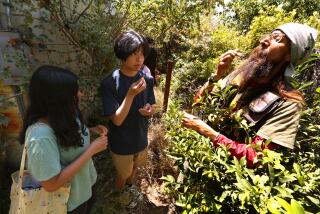One of the strangest letters Los Coyotes...
One of the strangest letters Los Coyotes Elementary Principal Jef Schleiger has received was wrapped in wrinkled brown paper.
“As I was opening it, I was thinking to myself this is just some piece of garbage,” Schleiger said.
The letter was from another school principal in England who had read in Newsweek magazine about Los Coyotes’ charter education program BEST (Building Ethics Standards Today).
To Schleiger’s surprise, more than 800 schools throughout the country, as well as schools in Germany and France, have requested information about the program. So many calls and letters have come to his office that now Schleiger splits his time between running Los Coyotes and fielding questions about BEST.
Los Coyotes started BEST in 1997 to teach children how to make ethically sound decisions. The main focus of the program is to build ethical behavior in elementary school students and help them understand that the individual decisions they make can have an impact on other people.
“An example we use is the ripple effect a pebble makes when it’s tossed into a pond,” Schleiger said.
In San Francisco last month, the California School Board presented Los Coyotes with the Golden Bell Award, given to 52 schools in the nation each year in recognition of exceptional education programs in state schools.
The planning of BEST began in the summer of 1996 when Los Coyotes applied for, and received, a $20,000 grant from the Vision 20/20 Career Coalition, an Orange County Department of Education program.
In February of 1997 Los Coyotes teachers Ellie Wrobel and Allyson Zaret attended a Character Education Partnership forum in San Diego to get ideas on how to start a character education program.
“We found that there were people who had already done a lot of work in the field of ethics,” said Schleiger.
After returning from San Diego, Wrobel and Zaret meet with city civic leaders to collectively develop a list of 12 attributes that represent sound ethics. Each month one attribute, such as perseverance, cooperation or responsibility, is incorporated into classroom instruction to reinforce its meaning.
Wrobel said the program has helped students interact with each other. “Just yesterday I overheard one kindergarten tell another, ‘You’re not being responsible,’ ” said Wrobel.
Both Wrobel and Schleiger feel the benefits of BEST will be seen in the years to come.
“If you teach kids respect and they never know disrespect, or if you teach them responsibility and they never know how to be irresponsible, then you’re ahead of the game in terms of making a positive impact in their lives,” Schleiger said.
Andre Briscoe can be reached at (714) 966-5848.
More to Read
Sign up for Essential California
The most important California stories and recommendations in your inbox every morning.
You may occasionally receive promotional content from the Los Angeles Times.










